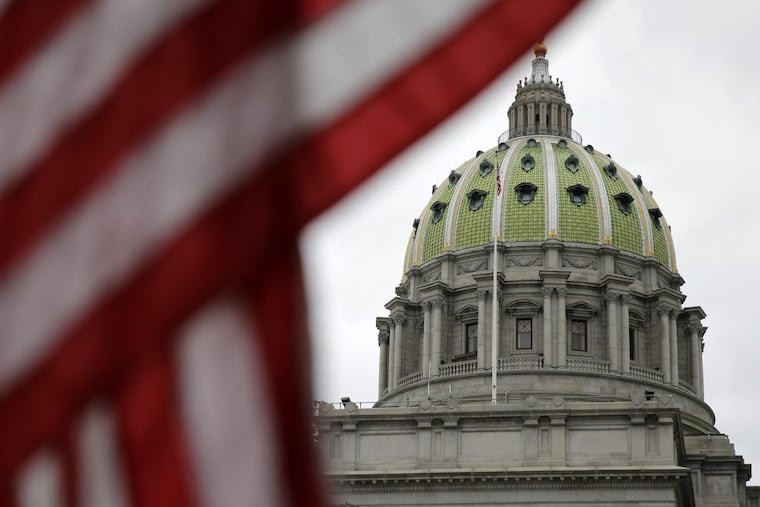Pa. Senate approves taxing natural gas drillers and utility bills
House leaders appeared in no hurry to take up the Senate measure, saying members would return sometime before the end of August.

HARRISBURG — After his no-new-taxes budget proposal went nowhere last weekend, Republican House Speaker Mike Turzai challenged his GOP colleagues in the state Senate: You try doing something.
On Thursday, the Senate delivered, narrowly approving a plan to balance Pennsylvania's nearly $32 billion budget in part by taxing drilling for natural gas, and by raising or imposing new taxes on telephone, electric, and gas bills.
Now, the spotlight returns to the House, which appears to be in no rush to come back to the Capitol to debate the Senate's revenue package. In a letter to their members Thursday afternoon, GOP leaders said to expect to return sometime before the end of August.
When they do, the leaders wrote, "we certainly have no intentions to rubber stamp these bills."
The game of political chicken increases the likelihood of a prolonged impasse. State Treasurer Joe Torsella, a Democrat, has warned that by the end of next month, the state could run out of money unless a responsible and complete budget is passed.
And because Pennsylvania's constitution requires a balanced budget, Gov. Wolf, also a Democrat, may be forced to freeze spending. His administration has avoided answering questions on when or if that would occur.
Negotiators have been trying for weeks to close a $2 billion gap in the state's budget, which has been out of balance for nearly a month. The legislature passed a spending plan hours before the start of the July 1 fiscal year, but did not approve a corresponding plan to pay for it.
Wolf at the time said he was confident lawmakers would resolve the issue quickly, and he allowed the spending plan to lapse into law without his signature. But nearly a month later, negotiators were still debating how to cover a $1.5 billion shortfall in the last fiscal year and a $700 million deficit in the fiscal year that began July 1.
The Senate's vote Thursday sought to jump-start the process, even though Republicans who hold a commanding majority in the chamber knew it would be a heavy lift because tax has been a curse word in the Capitol for years, as the legislature has grown more conservative.
"It's a tough day for many of us," Senate Majority Leader Jake Corman (R., Centre) said Thursday during debate on the revenue package, which passed, 26-24, and with both Democrats and Republicans voting for and against it. "It's not a day that we wanted to do. … I guess some advocate that we shouldn't do anything. We should sit back and let Rome burn," or let the governor find the money to balance the budget, he said.
After the vote, Corman added: "We're open to see what the House wants to do. I think the speaker said last week he wanted to see what the Senate and the governor would support. Well, here it is."
Corman said he spoke to House leaders after their weekend session but "we haven't spoken lately."
Turzai and other conservatives, particularly in the House, have for weeks derided proposals that include new or additional taxes.
For his part, Wolf, who is up for reelection next year, has kept a low profile as the two chambers have hurtled toward a showdown, even as he's signaled that he supports the Senate approach.
Together, the taxes approved Thursday would raise about $500 million, according to Senate estimates. The Senate also voted to borrow $1.3 billion against a landmark settlement between tobacco companies and the states.
Senate leaders have said they plan, at a future date, to advance a gambling expansion package that would bring in an additional $200 million. No details have been worked out for that proposal, and resolving it will not be easy — the issue of exactly how to expand gambling has bogged down budget talks in the last two years.
The Senate's plan imposes a new tax on natural gas extracted from the Marcellus Shale — based on volume — on top of the so-called impact fee drillers currently pay per well to local governments. The new proposed tax is expected to bring in $100 million annually.
Though there have been calls for a severance tax for nearly a decade, many Republican legislators have resisted it, arguing such a levy would scare away an industry that has created jobs and invested millions in the state.
The industry has pushed back too. In a statement minutes after the Senate's vote, David Spigelmyer, president of the Marcellus Shale Coalition, said the proposed severance tax, together with the new tax on natural gas bills, will cost jobs and "erode the commonwealth's competitive advantage."
"We remain committed and focused on fostering a meaningful dialogue with lawmakers and others about common-sense policies and solutions that can help create good-paying jobs for Pennsylvanians and other important community-level benefits for families across the commonwealth," said Spigelmyer, whose group represents unconventional gas producers.
The Senate plan also reinstates a 5.7 percent tax on natural gas bills, with $20 million of the money raised going to the state's heating-assistance program for the poor; increases taxes to 6 percent from the current 5 percent on telephone service, including cellphones; and raises taxes on electric service to 6.5 percent from the current 5.9 percent.
The Senate proposal also closes a loophole that allows some online retailers to avoid imposing and collecting the state's 6 percent sales tax on goods they sell.
Senators also seek to siphon $200 million from a state fund that provides insurance for doctors who have difficulty finding medical malpractice insurance elsewhere.